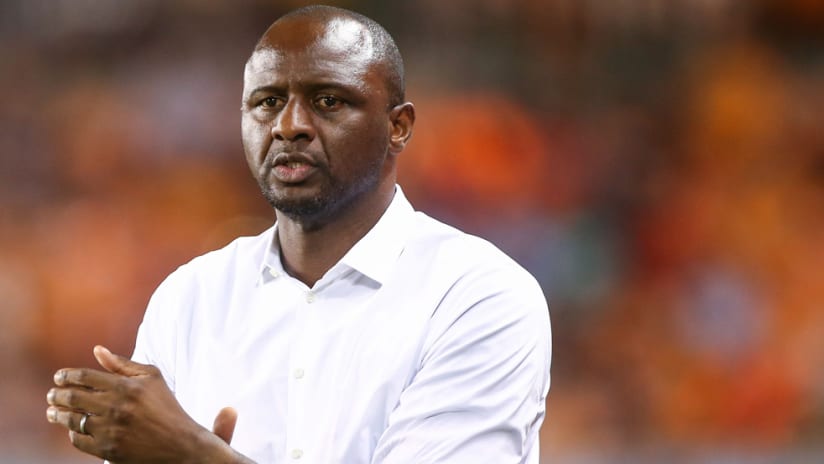Tuesday night served up two 1-1 draws, two tense penalty-kick shootouts and the final two quarterfinalists in the MLS is Back Tournament.
There was also some good old-fashioned MLSian weirdness, and even a mind game or two. Let’s chop it up.
Nobody believes ‘nobody believes in us!’… except the Loons
Was anyone really surprised that Minnesota United — undefeated so far in 2020 and considered by many back in March to be a contender in the West — managed to survive a Round of 16 knockout match against Columbus Crew SC?
"Everybody's crowned [the Crew] champions already," Minnesota manager Heath said following his club's final group stage game.
“People think I do it deliberately, but I didn't read or hear or see anything before the [Columbus] game that suggested we had a chance," Heath said after his team beat the Crew to advance to the quarters against San Jose. "But the most important people thought we had a chance, and the most important people are the players and our staff."
Heath's left back Chase Gasper echoed the sentiment in his postgame flash interview which had ESPN’s commentary team quite literally laughing out loud at the Loons’ dogged insistence that they’re overlooked and underrated regardless of ample evidence to the contrary:
It’s been well documented over many years that “nobody believes in us!” is one of the oldest and stalest motivational tactics in sports, and yet it continues to be a favored arrow in the quiver for many coaches, Heath chief (but not alone) among them in MLS.
And maybe he really does believe that his team is chronically disrespected; after the game his son Harrison took to Twitter to accuse The Athletic’s Jeff Rueter, who covers MNUFC in greater depth and detail than anyone, of rooting for the Loons to fail.
When all’s said and done, it doesn’t really matter how paranoid and implausible the rest of us think this line of reasoning is. Because it seems to connect with something deep inside the psyche of most pros, who’ve overcome incredible odds and obstacles to reach that level, and along the way often feed off the negative energy of others like it’s a protein shake or a burrito bowl.
Will that chip on the shoulder power Minnesota to an MLS Is Back trophy hoist? Well, why not? You won’t catch me giving them any bulletin-board material.
Inchy does it
Perhaps the most unfortunate part of the aforementioned psychological gymnastics is that it risks distracting from Heath’s exemplary tactical plan for beating the Crew.
Caleb Porter’s side entered this match on a roll. They were the only team at the tournament to win all three of their group-stage games and the only one that had yet to concede a single goal, and had accomplished all that by playing fun, fluid, proactive soccer geared around the midfield trio of Darlington Nagbe, Artur and Lucas Zelarayan.
Heath and his Loons wanted no part of any of that, at least not in their defensive third.
As Matt Doyle explains in his Top Tier segment, MNUFC happily conceded possession (the Crew won that department 65% to 35%), deployed Hassani Dotson as an additional defensive/destructive presence in central midfield and relied on their own iron triangle – center backs Michael Boxall and Jose Aja and defensive mid Ozzie Alonso just in front of them – to protect their penalty area and adjacent environs.
Heath readily embraced the traditional “right of the weak” against his favored adversaries, and when Minnesota snatched an early set-piece goal, Porter and his players couldn’t quite solve the riddle in time.
“When you’re playing a team like Minnesota that can now sit back up 1-0, the game becomes a lot more difficult,” said Porter. “It’s difficult to break down 10 guys 30 yards from goal. It’s the toughest thing to do in our game.”
It’s easy to envision the Loons doing this again when they meet the Quakes on Saturday, especially considering that a similar approach bagged them a 5-2 road win in San Jose back in March.
Howlers, and what comes after
Soccer is often described as a game of mistakes, and so it went on the final night of the Round of 16. On Monday night Quakes coach Matias Almeyda spoke inspiringly about his humanistic approach to management and noted that “accepting that somebody can make a mistake” was part of it.
Those words rang in my ears again 24 hours later as Steve Clark committed the proverbial howler to gift FC Cincinnati a goal from the penalty spot when his Portland Timbers were up 1-0 and seemingly in control.
Then Jurgen Locadia did him one better when he contrived to miss a gaping net from four yards out for what would’ve been a stunning late game-winner. Later Locadia would fail to convert his penalty kick in the shootout, despite having calmly netted the equalizer from the spot following Clark’s error. Scoring generally swells a striker’s confidence and hones their focus. Instead, here we had a very good one – one who cost an English Premier League club an eight-figure transfer fee two years ago – go ice-cold at a very inopportune time.
A compelling argument can be made that Portland survived and advanced because Locadia couldn’t redeem himself for his mistake, while Clark could. Goalkeepers and goalscorers work under some of the most pressurized conditions in the sport, and most survive by adopting levels of resilience and confidence that most of us simply can’t relate to.
“I'm a firm believer that the most important part is always how people respond to situations that are difficult,” said Timbers boss Giovanni Savarese postgame. “Clark is one that bounces [back] right away. When we went to PKs, he told me, ‘I got it, don't worry.’”
Sure enough, Clark, who has tasted this type of pain before, saved Locadia’s PK to rescue his team from his earlier gaffe and book a Saturday nightcap date with NYCFC.







